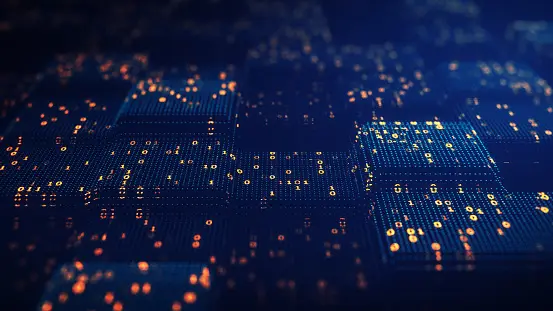
In today's digital age, two technologies have emerged as game-changers in various industries: blockchain and artificial intelligence (AI). Both technologies have their unique characteristics and applications, but when combined, they can create a powerful synergy that unlocks new possibilities and opportunities. In this article, we will explore the relationship between blockchain and AI, their integration, and the benefits they bring to the table.
Understanding Blockchain and AI
What is Blockchain?
Blockchain is an immutable and shared ledger that facilitates the secure exchange of encrypted data among multiple parties. It provides transparency, traceability, and security, making it an efficient storage solution. Bitcoin, the popular cryptocurrency, is a prime example of the safety and security offered by blockchain technology. Its decentralized nature and cryptographic techniques make it resistant to manipulation and fraud.
What is Artificial Intelligence?
Artificial intelligence, on the other hand, leverages computers, data, and machines to mimic human problem-solving and decision-making capabilities. It encompasses various subfields, such as machine learning and deep learning, which use AI algorithms to analyze data and make predictions.
AI offers numerous benefits, including automated decision-making, task automation, and reduced human errors. It fuels the development of technologies like big data, the internet of things (IoT), and robotics. However, AI's full potential can be realized when combined with blockchain technology.
The Interplay between Blockchain and AI
Transparent Data Source
One of the major advantages of combining blockchain and AI is the availability of a transparent data source. Blockchain's transparency makes it a reliable and refined data source for training AI applications. The traceability of nodes ensures that the source of data can be verified effectively, enhancing the trustworthiness of the AI system.
Autonomous System
Blockchain's decentralized nature ensures that no single entity controls all operations of an AI application. This autonomous system drives decentralization, allowing AI training and operations to be managed without constant supervision. It enables collaboration among multiple parties without the need for intermediaries, fostering trust and efficiency.
Privacy Protection
Blockchain's cryptographic techniques enhance privacy within the network, addressing concerns about data security in AI training and operations. Robust privacy systems enable the development of competitive and complex AI models, minimizing vulnerabilities and ensuring secure data management.
Distributed Computing Power
Training and maintaining AI models require significant computing power. Blockchain technology takes on the responsibility of providing the necessary computational resources, reducing the burden on individual machines. It also addresses concerns related to hardware and software requirements, data storage, and maintenance costs.
Security Enhancement
While blockchain technology offers inherent security features, its smart contracts are not foolproof. Exploiting vulnerabilities in smart contracts can potentially harm applications built on blockchain. To minimize such risks, AI is employed to generate more secure and intelligent contracts, reinforcing the security framework of blockchain.
Reading Efficiency
Blockchains often face limitations in data storage modes, sacrificing reading efficiency for write-intensive approaches. However, AI can help enhance the usage of blockchain by optimizing data storage methods. Novel protocols and algorithms, such as the TTA-CB protocol, can improve the speed of data queries, making blockchain more efficient.
Authenticity and Trust
Blockchain's digital record provides insights into the AI framework and the provenance of the data used, addressing challenges related to explainable AI. It enhances trust in data integrity and the recommendations provided by AI systems. Storing and distributing AI models on blockchain creates an audit trail, ensuring data security and authenticity.
Augmentation of AI
AI's ability to comprehend and process data rapidly is further enhanced by blockchain technology. Access to larger datasets, facilitated by blockchain-based business networks, allows AI to scale and provide actionable insights. It also promotes transparency and trust in the data economy by managing model sharing and data usage.
Automation and Efficiency
The integration of AI, blockchain, and automation brings added value to business processes by removing friction, increasing speed, and improving efficiency. AI models embedded in smart contracts can resolve disputes and optimize operations, ensuring the most sustainable and efficient outcomes.
The Ideal Model: Blockchain and AI in Harmony
Research demonstrates that there is a strong link between blockchain and AI, with both technologies evolving rapidly. While they have traditionally functioned independently, the convergence of blockchain and AI is becoming increasingly important. Combining the two technologies can revolutionize data handling and address critical data-related issues across various industries.
Blockchain's decentralized and secure nature ensures the privacy and integrity of data, while AI leverages machine learning to analyze and derive insights from vast amounts of data. Together, they enable advanced data analysis, discovery, diagnosis, and prevention of diseases, particularly in the healthcare industry.
The integration of blockchain and AI can impact multiple sectors, offering dynamic solutions for privacy, energy efficiency, data regulation, security, and scalability. By mining extensive data and creating new patterns and classifiers using AI, blockchain ensures the verification and authentication of data, promoting trust and security.
FAQ
1. What is the three-way relationship between blockchain, AI, and the cloud?
Blockchain, AI, and the cloud form the pillars of the industrial revolution. Each technology plays a crucial role in transforming processes, developing innovative products, and creating new business models. The combination of these three technologies can unlock greater value and enable businesses to harness the full potential of their data.
2. Which is better, artificial intelligence or blockchain technology?
AI and blockchain have distinct strengths and applications. AI concentrates power for organizations that can source and process large amounts of data, while blockchain technology empowers individuals to secure their data and generate economic value at smaller operational scales. Both technologies complement each other, offering unique benefits depending on the specific needs of a business or industry.
3. What other technologies can be combined with blockchain to enhance its capabilities?
The integration of AI and blockchain is a powerful combination that enhances data handling and security. Other technologies, such as big data analytics, IoT, and robotics, can also be integrated with blockchain to further optimize its capabilities and applications. The possibilities are vast, and the choice of technologies depends on the specific requirements of each use case.
4. How can we build a smart economy for AI services using blockchain technology?
By leveraging the power of blockchain technology, distributed ontology, trusted execution, and advanced cryptography, we can create an infrastructure that supports the AI revolution. This system provides a fluid medium for AI agents to collaborate, offering advanced features and capabilities. It enables secure and transparent sharing of knowledge, coordination, and decision-making, paving the way for a smart economy driven by AI services.
5. How can blockchain technology benefit the training of machine learning models?
Blockchain technology ensures faster automation processes compared to centralized databases. It allows human intervention and manipulation of the automation process as per specific scenarios. Moreover, it enables only authorized administrators to modify the data sent to machine learning models, ensuring data integrity and consistency. The decentralized nature of blockchain also ensures that model training occurs consistently and in a timely manner.
The combination of blockchain and AI holds immense potential to revolutionize industries and maximize the value of data. By leveraging the transparency, security, and decentralization of blockchain technology, AI can reach new heights of efficiency, accuracy, and trustworthiness. The interplay between these technologies creates a powerful synergy that unlocks new possibilities and opportunities for businesses and individuals alike. As the convergence of blockchain and AI continues to evolve, we can expect to see further advancements and innovations that will shape the future of technology.
OUR OFFICIAL CHANNELS
Website - https://www.clanity.com/
Discord - https://discord.gg/6rDdVwextJ
Telegram - https://t.me/clanity
Twitter - https://twitter.com/clanityofficial
Facebook - https://www.facebook.com/clanityofficial
Linkedin - https://www.linkedin.com/company/clanityofficial/
Medium - https://medium.com/@clanity
Reddit - https://www.reddit.com/r/Clanity/
Instagram - https://www.instagram.com/clanityofficial/
Expand your business reach to new and untapped markets
Expand your business reach to new and untapped markets
Unlock new revenue streams and opportunities for growth and take control of your business's future today!

